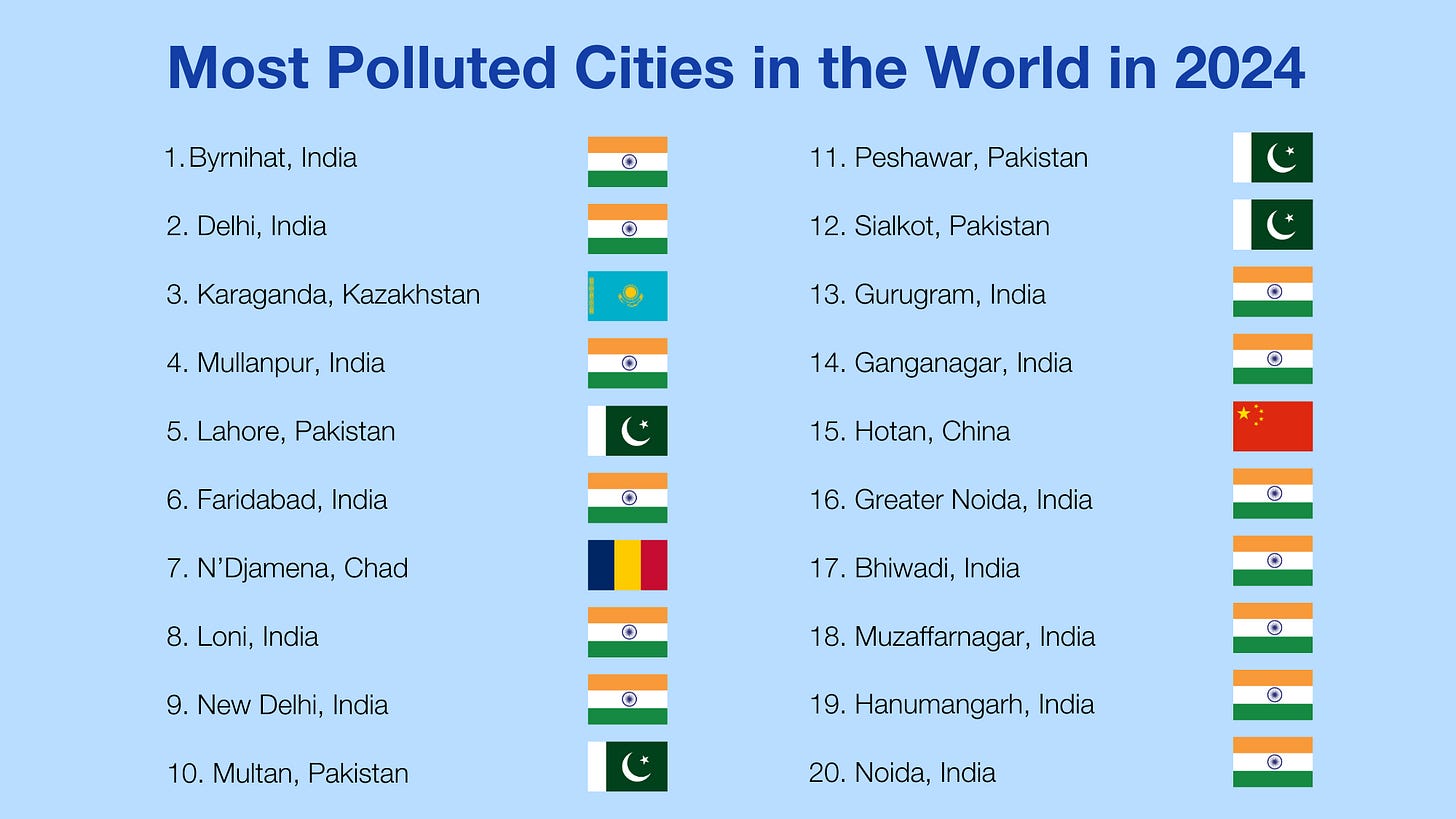Sunny climate stormy climate | Weekly digest #63
The irony of cutting down the Amazon forest to make way for COP 30, 6 of the world's top 10 polluted cities are in India and Finland's attempt at storing nuclear waste permanently
Hello folks!
Here’s this weeks dose of climate news where as usual I bring one sunny story that gives hope and two stormy ones that are a cause for alarm. Hope you like them!
🌩️ Stormy news 🌩️
1. In classic irony, the Amazon forest is being felled to build a road for COP 30!
What are we talking about?
COP or Conference of Parties is an annual climate summit where world leaders come together to agree on goals and actions needed for climate action. COP 30 is expected to be held in Brazil later this year.
Last week, there was a report of a new four-lane highway cutting through tens of thousands of acres of protected Amazon rainforest being built for COP30 in the Brazilian city of Belém.
Why does this matter?
The Amazon plays a vital role in maintaining the ecological balance of the world. Deforestation in the Amazon has many negative consequences, such as:
Loss of biodiversity: The Amazon is home to 10% of the world’s known species. Deforestation destroys habitats, driving species to extinction and reducing genetic diversity.
Loss of carbon sinks: The Amazon stores vast amounts of carbon in its trees. When forests are cleared, we lose these carbon sinks.
Displacement of Indigenous Communities who often depend on the forest for their livelihoods.
Disruption of the water cycle: Trees in the Amazon contribute to a process called "flying rivers", where they release moisture into the air, influencing regional and even global rainfall.
Soil Degradation and Desertification: Without tree cover, the soil loses its fertility.
The irony of this is not lost on anyone. Trees are being to make way for a climate summit. The deforestation contradicts the very purpose of a climate summit.
Sources for further reading
We now also have a Youtube channel. Please check it out!
2. India has 6 of the world's 10 most polluted cities in terms of air quality
What are we talking about?
IQ Air, a Swiss air quality monitoring company released the 2024 World Air quality report last week.
According to the report, 6 of the world’s 10 most polluted cities are in India.
Only 7 countries met the WHO annual average PM2.5 guideline of 5 µg/m3: Australia, Bahamas, Barbados, Estonia, Grenada, Iceland, and New Zealand.
The five most polluted countries in 2024 were Chad (91.8 µg/m3), Bangladesh (78.0 µg/m3), Pakistan (73.7 µg/m3), Democratic Republic of the Congo (58.2 µg/m3) and India (50.6 µg/m3)
Byrnihat, India was the most polluted metropolitan area of 2024, with an annual average PM2.5 concentration of 128.2 µg/m3
Why does this matter?
Poor air quality has major impacts on health. It can result in severe respiratory and cardio-vascular disorders and even cancer.
While the poor air quality is not caused by the climate crisis, the sources of emissions that cause global warming and air pollution are the same - coal powered plants, vehicular emissions, waste burning etc.
Sources for further reading
🌞 Sunny news 🌞
3. Nuclear waste may find a forever home
What are we talking about?
Finland may soon become the first country to develop a permanent way to store spent nuclear fuel by burying it in tunnels deep underground.
Posiva Oy, a joint venture owned by two Finnish nuclear power companies, is on the cusp of officially starting operations at what is set to be the world’s first permanent underground disposal site for spent nuclear fuel.
In Finland, which gets more than 40 percent of its power from nuclear energy, Posiva is currently doing a trial run for this project.
Other countries are following in Finland’s footsteps. France, Sweden and Switzerland have selected sites for planned projects, and other projects have been proposed in China, Canada, Germany, Hungary, Britain and Japan, according to the World Nuclear Association.
Why does this matter?
As the world moves away from fossil fuels but the demand for energy continues to rise, nuclear energy will become an increasingly important source. (For instance, India in its latest budget announced its ambition to have 100 GW of nuclear power capacity by 2047)
Currently all nuclear plants use temporary storage sites, but they come at a huge cost and also risks. Hence finding a permanent solution for the spent nuclear fuel is critical to grow nuclear power capacity.
Sources for further reading
You can read previous editions of the newsletter -
Sunny climate, stormy climate | News Digest #62
Sunny climate, stormy climate | News Digest #61
Sunny climate, stormy climate | News Digest #60
If you liked this newsletter, please hit like or leave a comment. If you are a climate champion and want to take this conversation to more people, please share the newsletter with a friend, family member or colleague who may like it too!





